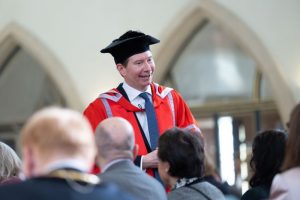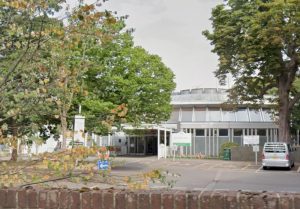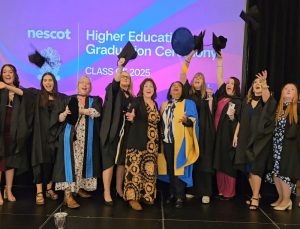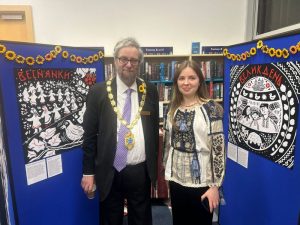4 Years of War in Ukraine, 4 Years of Heart Ache, Support and Immense Pride in this Community
By Roy Deadman, Chairman and Co-Founder, Surrey Stands With Ukraine
Four years ago, we woke to news that changed Europe overnight. Ukraine had been invaded. I remember sitting in shock, watching the images unfold, feeling an overwhelming mix of disbelief and anger. I was incredibly angry that Russia had invaded Ukraine. What mattered to me in that moment was not politics, but people. A proud European nation was under attack, and I wanted to do all I could to defend it.
On day one of the war, I called my Ukrainian friend Natalia Irvine, who lives here in Epsom. I asked her a simple question: “What do you need?” I made her a promise that I would support her and her country in any way I could, for as long as it took. At that point, I thought in terms of weeks, perhaps months. I could never have imagined we would still be here four years later.
Together, Natalia and I reached out to our local community. We asked for help and the response was overwhelming. Donations flooded in almost immediately. People wanted to stand with Ukraine. They wanted to do something tangible in the face of such horror.
Within hours, it became clear that we needed space. The generosity of the Ashley Centre was extraordinary. On day one, they offered us 6,000 square feet of retail space. Even though it was rent-free, I had to take a personal risk and sign a lease that made me liable for the business rates, as we were not yet a registered charity. It was a leap of faith, but it was the start of what we proudly called “The Hub.”
By the end of that first week, 180 volunteers had registered with us. We had raised close to £20,000 and sent two truckloads of humanitarian aid, donated by this incredible community. It was breathtaking how quickly everything moved.
Those early days were intense. Some people spent up to 20 hours at a time sorting and packing boxes. We worked through exhaustion fuelled by tea, determination and a shared sense of purpose. The emotional rollercoaster was constant, heartbreak at what we were seeing unfold in Ukraine, and immense pride at how Epsom and Ewell pulled together.
We quickly realised this could not be chaotic goodwill alone. We had to run it like a small business operation. Every item had to be sorted, categorised, packed and properly manifested before being loaded onto whichever truck was available. Transport offers poured in, with drivers volunteering to take aid directly into Ukraine. It was inspiring, and it required careful coordination.
In that first week, we formed a core team. Some volunteers stepped forward to create a committee to help make difficult decisions about what we could send and where it should go. These were not easy choices. Demand was enormous, and resources, though generous, were not infinite.
Natalia, based here in Epsom, worked tirelessly alongside us. Her sister Anya, coordinating from inside Ukraine, helped guide where our aid would have the greatest impact. Between Epsom and Ukraine, somehow, we made it work. It was teamwork across borders, built on trust and shared determination.
Very quickly, we understood that we needed to become part of a registered charity. One reason was practical, the burden of business rates. The other was credibility, and the invaluable ability to claim Gift Aid on donations. I was introduced to Lionel Blackman, who ran a charity called Harrop HR Missions. After a coffee and a conversation about our mission, Lionel generously agreed to let us operate under his charity’s structure.
From there, Surrey Stands With Ukraine became the fully formed charity we know today: Surrey Stands With Ukraine. As we reach the four-year mark, we have shipped £5 million worth of aid. We have sent 153 trucks, a fire engine, over 50,000 mobility aids and 650 winter family survival packs, and so much more besides.
Today, our charity is based at Global House, where we share space with the totally amazing Epsom and Ewell Refugee Network. EERN provides local support for Ukrainian families who have made Epsom and Ewell their temporary home. It has been a privilege to work alongside such a dedicated team and to witness their daily commitment.
One unexpected gift from these four years has been friendship. What began as an emergency response has grown into a powerful community bond. I have made lifelong friends through this work. We meet for quiz nights, coffee mornings, beers, lunches and parties. That human connection is not a side note, it is central to our resilience.
This work is emotionally hard. While we do not face the same unimaginable horror that Ukrainians endure, we are closer to it than most. We receive constant requests for help. We watch videos from the ground. We hear heartbreaking stories of families torn apart. We cry. We carry it with us.
That friendship network sustains us. There is always someone ready with a hug, someone to make you smile, someone to pick you up when you are exhausted. This is what being part of this charity and this community truly means.
Every single one of us is a volunteer. No one is paid a wage. We are there because we care deeply and because we want to do something meaningful on behalf of the Ukrainian people. That purity of purpose has shaped everything we do.
Over these four years, I have learned so much about Ukraine and its people. The obvious lesson is their extraordinary courage. But that courage is not confined to the front lines. It runs through all Ukrainians, young and old, men and women. Their commitment to preserving their culture, history and identity in the face of attempts to erase it is profoundly inspiring.
When I made that promise on day one, I thought this would be short term. I do believe Western governments have not done enough, or not quickly enough. This is a war in Europe, on our doorstep. History teaches us hard lessons, yet we so often seem slow to act.
If we are not careful, we may look back five or ten years from now at a Europe that has changed for the worse. It feels at times as though we have moved from a post-war world into a pre-war one. The longer this conflict continues without decisive resolution, the more lives are lost.
And yet, despite the geopolitical uncertainty, I find hope here at home. I find it in every donated sleeping bag, every cheque written, every volunteer shift completed. I find it in schoolchildren raising funds and pensioners knitting winter hats.
When people come together with kindness in their hearts, extraordinary things can happen. A community can unite behind people from another country simply because it is the right thing to do. That gives me hope.
I am immensely proud of what Epsom and Ewell has done over these four years. Proud to live here. Proud to raise my family here. Proud to stand shoulder to shoulder with all of you.
Four years of war. Four years of heartbreak. Four years of unwavering support. And four years of immense pride in this remarkable community.
Roy Deadman – Chair Surrey Stands With Ukraine
There will be a commemoration today at 5pm in The Ashley Centre, marking the 4th anniversary of the war and the Mayor of Epsom and Ewell Cllr Robert Leach will be in attendance. All are welcome.
Image: Roy Deadman with SSWU’s latest appeal for negative pressure wound dressings
Related reports:
Appeal to twin Epsom with Bucha in Ukraine
Festival of Friendship –Epsom and Ewell – Ukraine
From Abramovich’s frozen wealth to Epsom’s Ashley Centre – support for Ukraine continues
From Ukraine to Epsom: How Music and Kindness Struck the Right Note
Music and dance for Ukraine at Epsom Methodist Church
Epsom MP leads cross-party delegation to Ukraine to examine impact of explosive weapons

























